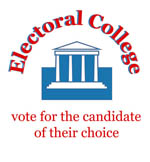News
Voting Counts and Counting Votes
Dec 18, 2008
 Most states (48 of 50 and the District of Columbia) award all their electoral votes in a presidential election to the candidate who wins the majority of votes in their state. This results in serious disincentives for any candidate to campaign in those states that are safely in the camp of one party or another and, when you think about it, in equally serious disincentives for voters in those states to get out and vote.
Most states (48 of 50 and the District of Columbia) award all their electoral votes in a presidential election to the candidate who wins the majority of votes in their state. This results in serious disincentives for any candidate to campaign in those states that are safely in the camp of one party or another and, when you think about it, in equally serious disincentives for voters in those states to get out and vote.
These disincentives provide an argument for those who would do away with the Electoral College in favor of a popular vote for president, an even better argument than the one opposing the Electoral College because it favors small states.
FairVote.org provides hard numbers to back up these disincentive claims in their press release, 2008's Shrinking Battleground and Its Start [sic] Impact on Campaign Activity.1 They find:
- Over half the presidential campaign events (57 percent) in the last month of the campaign took place in only four states (OH, FL, PA, VA) and virtually all the events during that period took place in only 18 states.
- Over half the spending (54.5 percent) in the last two weeks of the campaign went to those same four states, and virtually all the spending during that period went to only 17 states.
- Fourteen of the states where the outcome was not in doubt saw a drop in numbers of voters from the 2004 election.
- The number of states which can be considered competitive battleground states for presidential elections have been cut in half since 1960, from 33 to 16.
Several states (NJ, MD, IL, and HI) have exercised their power in an end run around the Electoral College. They have signed on to the National Popular Vote (NPV) bill, which says they agree to assign all their electoral votes to the winner of the national popular vote in all 50 states and the District of Columbia once the number of participating states represents a majority of the Electoral College.
If you believe the president should be elected by a majority or plurality of the popular vote, you may want to encourage your state legislature to sign on to the NPV bill.
____________________
1 Accessed December 14, 2008
Copyright © 2008 All Together Now.